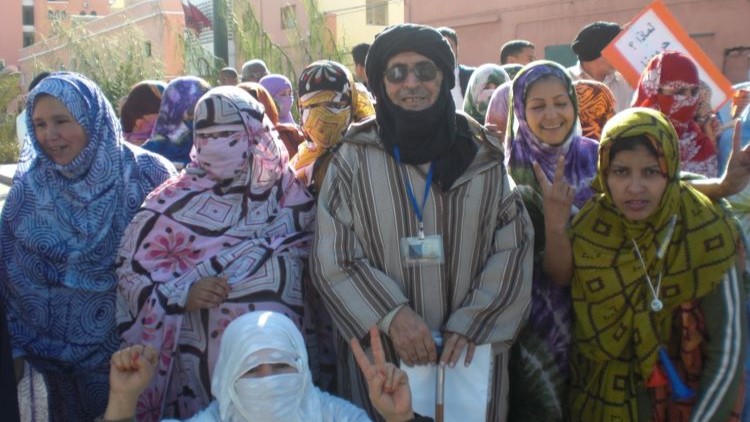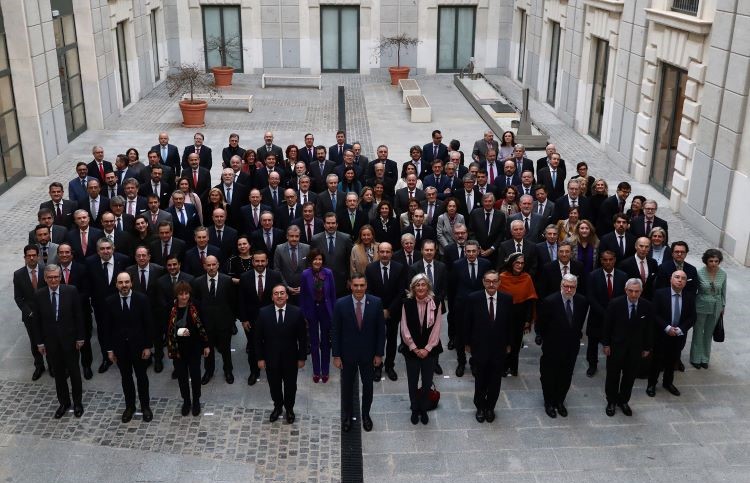Eduardo González
The Sumar Plurinational Parliamentary Group, a minority partner of the current coalition Government, has presented a Bill to grant nationality by letter of nature to Sahrawis born under the Spanish administration.
The proposal, presented on November 30 and accepted for processing by the Board of the Congress on December 5, recalls that, in 1958, while the UN supported the decolonization processes, the Franco regime decided to convert its colonies into Africa in overseas provinces of Spain, which allowed the then called “Spanish Sahara” (held by Spain since 1885) to become known as province number 53, with the status of metropolitan province.
As a result, its inhabitants were represented in the Parliament of the dictatorship, had a Spanish national identity document and were able to study at Spanish Universities, access the Civil Service and even be members of the Army and participate in the referendum. 1966 on the draft Organic State Law. Added to this, Sumar continues, are “the linguistic ties and the daily use of Spanish that the Sahrawis still make today.”
Twenty years after its conversion into a metropolitan province, Spain definitively ended its presence in the territory on February 26, 1976. A Royal Decree of August 1976 established that those who met certain requirements could opt for Spanish nationality within a period of a year, “but the Spanish administration had already abandoned the territory, therefore making the effective exercise of that option impossible, as the Supreme Court revealed” in 1998 and 1999, recalls Sumar.
“In recent years, Spain has developed a set of activities aimed at strengthening historical ties with the Sahrawi people, such as measures to promote Spanish, which is one of its hallmarks. It is an option consistent with official policies, followed by Spanish governments of different types, which tend to strengthen ties with those who shared part of their historical development with our country,” says Yolanda Díaz’s party.
Furthermore, it continues, “this is not the first time that the procedure for granting Spanish nationality by letter of nature has been used as an instrument to strengthen ties between those of us who share a common past”, as occurred with the law of June 2015 for the granting of Spanish nationality to the Sephardim descendants of the Jews expelled from Spain by the Edict of Granada of 1492.
The Bill
For all these reasons, the Sumar Bill calls for “the granting of Spanish nationality by letter of nature to Sahrawis born in the territory of Western Sahara under the administration of Spain”, taking into account “this historical orientation” of Spanish legislation and “the strong connection” of the Saharawi population with Spain, “since their ties with the ancient metropolis remain as alive today as they were more than four decades ago, due to their knowledge of the language, the close cooperation developed from all official Spanish institutions and the general feeling of connection with the Sahrawi people of the Spanish people.”
The proposed rule establishes the evidentiary means for accreditation, regulates the procedure to obtain Spanish nationality and even contemplates the possibility that the direct descendants of the Sahrawis born during under the Spanish administration, “in the first degree of consanguinity, can opt for Spanish nationality when any of their ancestors acquire it through the letter of nature procedure regulated in this law, for which a period of five years is established from the registration of that person in the Civil Registry.
In addition, the law proposes a modification of the Civil Code so that the Sahrawis are included among the groups benefiting from the granting of nationality by residence. Specifically, Sumar requests that the reduced period of legal residence in Spain of two years for the acquisition of Spanish citizenship can also be applied to Sahrawis, as is already the case with Sephardim and nationals of Ibero-American countries, Andorra, the Philippines, Equatorial Guinea or Portugal.
“In short, this law aims to harmonize the legal responses offered by the Spanish State to the same situation, as well as to recognize the deep connection of Western Sahara with Spain, through the granting of nationality by letter of nature to the Sahrawis born under Spanish administration, thus contributing to strengthening ties and the historical relationship,” adds Sumar.
In June 2020, the Supreme Court established that being born in Western Sahara before 1975 does not give the right to obtain Spanish nationality of origin because the former province could not be considered national territory during the Spanish administration and, therefore, “being born in the Sahara” during Spanish rule cannot be equated with “being born in Spain” for the purposes of nationality by origin. From a legal point of view, the Sahrawis are stateless without nationality, although they do have, for humanitarian reasons, the Algerian passport, which acts as a travel document but does not grant them citizenship.
Since the departure of Spain, the territory of Western Sahara has been controlled by Morocco, whose sovereignty over the former Spanish province does not have international legal recognition. The United Nations has repeatedly called for the beginning of a decolonization process. Sumar, led by Vice President Yolanda Díaz, has been very critical of the decision of the President of the Government, Pedro Sánchez, to support the autonomy plan proposed by Morocco for Western Sahara. In its electoral program for the general elections on July 23, Sumar included the commitment to “quickly reverse the change in position adopted in 2022 with respect to Western Sahara” and proposed the constitution of “a working commission on “the historical responsibility of Spain with the Sahrawi people.”







